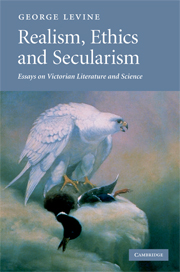Book contents
- Frontmatter
- Contents
- Preface
- Introduction
- Part I THE SUBJECT BROACHED: OTHERNESS, EPISTEMOLOGY, AND ETHICS
- Part II ETHICS WITHOUT GOD, OR, CAN “IS” BECOME “OUGHT”?
- Chapter 2 Is life worth living?
- Chapter 3 Ruskin and Darwin and the matter of matter
- Chapter 4 Scientific discourse as an alternative to faith
- Chapter 5 In defense of Positivism
- Chapter 6 Why science isn't literature: the importance of differences
- Part III LITERATURE, SECULARITY, AND THE QUEST FOR OTHERNESS
- Epilogue
- Index
Chapter 3 - Ruskin and Darwin and the matter of matter
Published online by Cambridge University Press: 22 September 2009
- Frontmatter
- Contents
- Preface
- Introduction
- Part I THE SUBJECT BROACHED: OTHERNESS, EPISTEMOLOGY, AND ETHICS
- Part II ETHICS WITHOUT GOD, OR, CAN “IS” BECOME “OUGHT”?
- Chapter 2 Is life worth living?
- Chapter 3 Ruskin and Darwin and the matter of matter
- Chapter 4 Scientific discourse as an alternative to faith
- Chapter 5 In defense of Positivism
- Chapter 6 Why science isn't literature: the importance of differences
- Part III LITERATURE, SECULARITY, AND THE QUEST FOR OTHERNESS
- Epilogue
- Index
Summary
What profit can there be in once again juxtaposing Ruskin and Darwin? Everyone knows about Ruskin's hostility to Darwin's theory; most people think that his rejection of it was excessive, retrograde and misguided; and after all, haven't we heard enough about the science wars – culture vs. science, Arnold vs. Huxley; Leavis vs. Snow; Sokal vs. Social Text? In fact, virtually none of the issues over which the battles have been fought have been resolved. Stephen Jay Gould may have insisted that religion and science were two “non-overlapping magisteria,” but not a lot of deeply religious or deeply secular people believe it. The issues may slide back beneath the surface, and they may even, as Gould argues, be illogical – though I'm not sure they are – but they continue to infect virtually everyone's relation to matters of “fact,” and to leave in contention the matters of “value.” However much we may want to argue that science/culture, science/religion are compatible, we all have at least a sneaking suspicion that they are not. The dualism can survive only because it is a dualism – one side, science, has nothing to do with religion; the other side, religion, has nothing to do with science. Theoretically, this is possible. In historical fact, the two have clashed regularly since the Renaissance.
- Type
- Chapter
- Information
- Realism, Ethics and SecularismEssays on Victorian Literature and Science, pp. 75 - 99Publisher: Cambridge University PressPrint publication year: 2008
- 1
- Cited by



